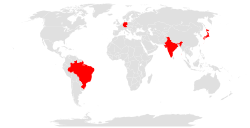G4 nations
| G4 nations | |
|---|---|
 |
|
The G4 nations comprising Brazil, Germany, India, and Japan are four countries which support each other’s bids for permanent seats on the United Nations Security Council. Unlike the G7, where the common denominator is the economy and long-term political motives, the G4's primary aim is the permanent member seats on the Security Council. Each of these four countries have figured among the elected non-permanent members of the council since the UN's establishment. Their economic and political influence has grown significantly in the last decades, reaching a scope comparable to the permanent members (P5). However, the G4's bids are often opposed by the Uniting for Consensus movement, and particularly their economic competitors or political rivals.
The UN currently has five permanent members with veto power in the Security Council: China, France, Russia, the United Kingdom, and the United States- comprising the victors of World War II. The G4 nations are regularly elected to two-year terms on the Security Council as non-permanent members by their respective regional groups: in the 24-year period from 1987 to 2010, Brazil and Japan were elected for five terms each, Germany for four terms (one term as West Germany and three terms as unified Germany) and India for two terms. Cumulatively, the G4 has spent 64 years on the Security Council since the UN's inception, with each country serving at least a decade. By comparison, the three permanent members of the Security Council who have maintained their seats since the UN's founding (France, the UK, and the US) have each accrued 71 years of membership. The People's Republic of China has held its permanent seat for 45 years, since it replaced the Republic of China in 1971, and Russia has held its permanent seat for 25 years, since it replaced the Soviet Union in 1991.
...
Wikipedia
